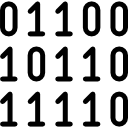Data representation: Difference between revisions
Mr. MacKenty (talk | contribs) (Created page with "<iframe width="560" height="315" src="https://www.youtube.com/embed/wF4wzQNB_G8?list=PLCiOXwirraUDIUDRlk21mH1Y_wCpYaMii" frameborder="0" allowfullscreen></iframe>") |
Mr. MacKenty (talk | contribs) No edit summary |
||
| Line 1: | Line 1: | ||
<center> | |||
<blockquote style="padding: 5px; background-color: #FFF8DC; border: solid thin gray;"> | |||
[[File:Exclamation.png]] This is an '''important concept'''. You should fully understand this. | |||
</blockquote> | |||
</center> | |||
[[File:binary.png|frame|right|This is a basic concept in computer science]] | |||
Computers use binary - the digits 0 and 1 - to store data. A binary digit, or bit, is the smallest unit of data in computing. It is represented by a 0 or a 1. Binary numbers are made up of binary digits (bits), eg the binary number 1001. | |||
The circuits in a computer's processor are made up of billions of transistors. A transistor is a tiny switch that is activated by the electronic signals it receives. The digits 1 and 0 used in binary reflect the on and off states of a transistor. | |||
Computer programs are sets of instructions. Each instruction is translated into machine code - simple binary codes that activate the CPU. Programmers write computer code and this is converted by a translator into binary instructions that the processor can execute. | |||
All software, music, documents, and any other information that is processed by a computer, is also stored using binary.<ref>http://www.bbc.co.uk/education/guides/zwsbwmn/revision/1</ref> | |||
== Why is data stored in binary == | |||
<html> | |||
<iframe width="560" height="315" src="https://www.youtube.com/embed/wF4wzQNB_G8?list=PLCiOXwirraUDIUDRlk21mH1Y_wCpYaMii" frameborder="0" allowfullscreen></iframe> | <iframe width="560" height="315" src="https://www.youtube.com/embed/wF4wzQNB_G8?list=PLCiOXwirraUDIUDRlk21mH1Y_wCpYaMii" frameborder="0" allowfullscreen></iframe> | ||
</html> | |||
== Do you understand this topic? == | |||
* What is ascii? | |||
== Do you have an advanced understanding about this topic? == | |||
* convert number to ASCII and vice-versa | |||
== See Also == | |||
* [[Binary]] | |||
== References == | |||
<references /> | |||
[[Category:computer organization]] | |||
[[Category:Very important ideas in computer science]] | |||
Revision as of 11:59, 1 June 2016
This is an important concept. You should fully understand this.
Computers use binary - the digits 0 and 1 - to store data. A binary digit, or bit, is the smallest unit of data in computing. It is represented by a 0 or a 1. Binary numbers are made up of binary digits (bits), eg the binary number 1001. The circuits in a computer's processor are made up of billions of transistors. A transistor is a tiny switch that is activated by the electronic signals it receives. The digits 1 and 0 used in binary reflect the on and off states of a transistor. Computer programs are sets of instructions. Each instruction is translated into machine code - simple binary codes that activate the CPU. Programmers write computer code and this is converted by a translator into binary instructions that the processor can execute. All software, music, documents, and any other information that is processed by a computer, is also stored using binary.[1]
Why is data stored in binary[edit]
Do you understand this topic?[edit]
- What is ascii?
Do you have an advanced understanding about this topic?[edit]
- convert number to ASCII and vice-versa
